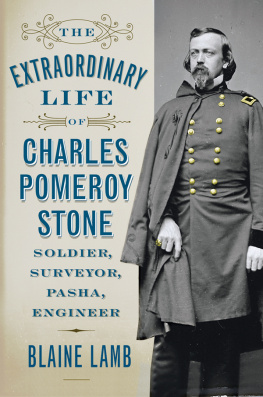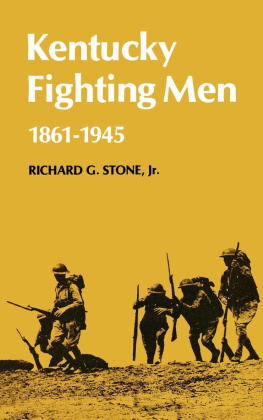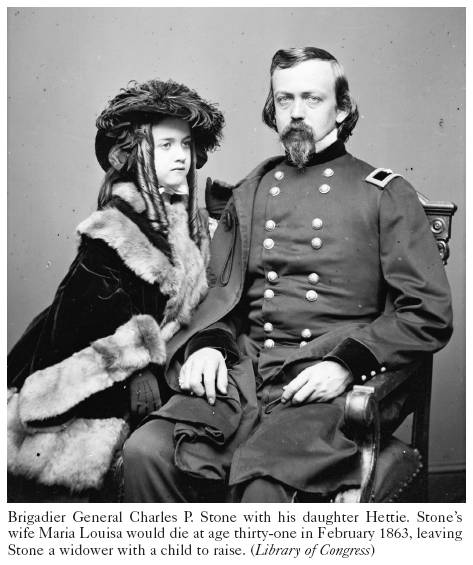Blaine Lamb - The Extraordinary Life of Charles Pomeroy Stone: Soldier, Surveyor, Pasha, Engineer
Here you can read online Blaine Lamb - The Extraordinary Life of Charles Pomeroy Stone: Soldier, Surveyor, Pasha, Engineer full text of the book (entire story) in english for free. Download pdf and epub, get meaning, cover and reviews about this ebook. year: 2020, publisher: Westholme Publishing, genre: Non-fiction. Description of the work, (preface) as well as reviews are available. Best literature library LitArk.com created for fans of good reading and offers a wide selection of genres:
Romance novel
Science fiction
Adventure
Detective
Science
History
Home and family
Prose
Art
Politics
Computer
Non-fiction
Religion
Business
Children
Humor
Choose a favorite category and find really read worthwhile books. Enjoy immersion in the world of imagination, feel the emotions of the characters or learn something new for yourself, make an fascinating discovery.
- Book:The Extraordinary Life of Charles Pomeroy Stone: Soldier, Surveyor, Pasha, Engineer
- Author:
- Publisher:Westholme Publishing
- Genre:
- Year:2020
- Rating:4 / 5
- Favourites:Add to favourites
- Your mark:
The Extraordinary Life of Charles Pomeroy Stone: Soldier, Surveyor, Pasha, Engineer: summary, description and annotation
We offer to read an annotation, description, summary or preface (depends on what the author of the book "The Extraordinary Life of Charles Pomeroy Stone: Soldier, Surveyor, Pasha, Engineer" wrote himself). If you haven't found the necessary information about the book — write in the comments, we will try to find it.
Civil War Hero and Scapegoat, Surveyor of Mexico, General of the Egyptian Army, and Builder of the Statue of Libertys Pedestal
In the winter of 1861, as the secession crisis came to a head, an obscure military engineer, Charles Pomeroy Stone, emerged as the rallying point for the defense of Washington, D.C. against rebel attack. He was protector of the newly elected president and right-hand man of the armys commanding general, General Winfield Scott, under whom he had served with distinction during the MexicanAmerican War. Nevertheless, with in a year, this same hero sat in a military prison accused of incompetence and possible treason.
Like other Union officers, Stone had the misfortune to run afoul of radical politicians in the nations capital who sought to control the war effort by undermining the professional military establishment. Their weapon, the Joint Committee on the Conduct of the War, applied a litmus test of commitment to abolition, loyalty to the Republican Party and battlefield success for the retention and promotion of army commanders. Stone, a Democrat who did not see the conflict as a crusade against slavery, and who lost his only battle, failed on all counts.
Readers of Civil War history know Stone best for his mistreatment at the hands of the Joint Committee.When his name appears, it is almost always in connection with the battle at Balls Bluff, Virginia, during which a close associate of Lincolns was killed, and its aftermath. His story, however, goes far beyond that engagement. In The Extraordinary Life of Charles Pomeroy Stone: Soldier, Surveyor, Pasha, Engineer that ranges from the Halls of Montezuma to Gold Rush California, and from the pyramids of Egypt to the foot of the Statue of Liberty, historian Blaine Lamb brings to light the many facets of Stones remarkable life and career. He weaves into the narrative such characters as Ulysses S. Grant,William Tecumseh Sherman, Abraham Lincoln,Winfield Scott, Alexander von Humboldt, Thaddeus Lowe, Chinese Gordon, Khedive Ismail, and Frederic Auguste Bartholdi. But the center of this tale of nineteenth-century adventure, exploration, war, and intrigue remains Stone himself, a man of honor, steadfast loyalty, and tragic innocence.
Blaine Lamb: author's other books
Who wrote The Extraordinary Life of Charles Pomeroy Stone: Soldier, Surveyor, Pasha, Engineer? Find out the surname, the name of the author of the book and a list of all author's works by series.






![Fawcett - How to lose the Civil War : [military mistakes of the War between the States]](/uploads/posts/book/92687/thumbs/fawcett-how-to-lose-the-civil-war-military.jpg)

